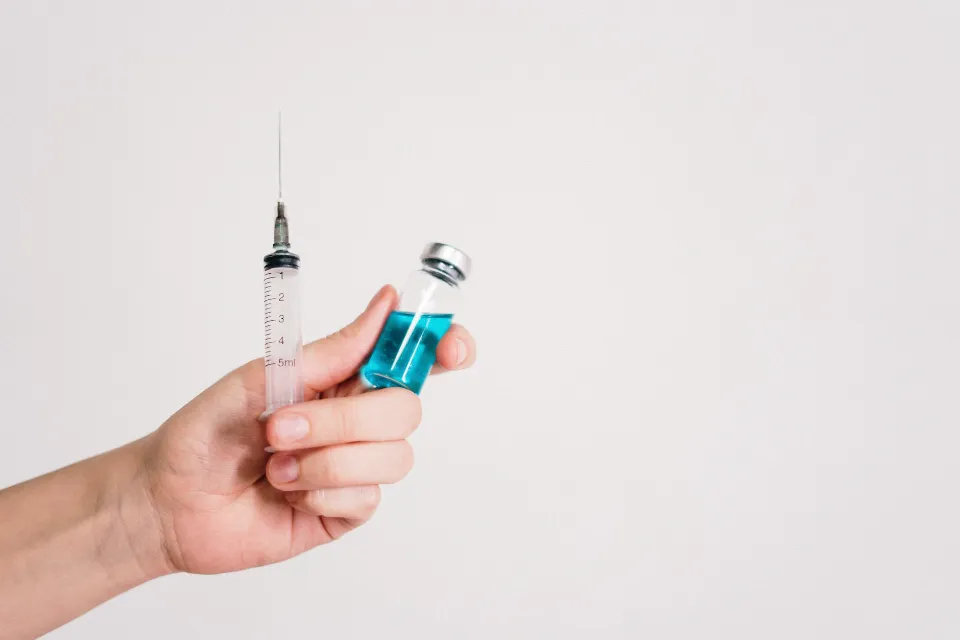Where the vaccine was administered, some people experience excruciating shoulder pain and have trouble moving their arms. The vaccine needle inadvertently striking a ligament, tendon, or bursa results in this condition, which is known as a vaccination-related shoulder injury (SIRVA).
The severe allergic reaction known as anaphylaxis can be brought on by vaccinations. With the pneumonia vaccine, the risk is said to be one in a million. Swelling of the face and throat, trouble breathing, a rapid heartbeat, dizziness, or weakness may be symptoms. Some premature infants who received intramuscular vaccine injections have been noted to experience apnea (temporary cessation of breathing).
It will be helpful to you if you have a general understanding of the pneumonia vaccine and any potential side effects.
What is Pneumonia Vaccine?
You can avoid getting pneumonia by receiving an injection that protects against pneumococcal disease. There are two pneumococcal vaccines licensed by the Food and Drug Administration (FDA) for use in the United States:
- PCV13 — Prevnar 13®: The 13 types of pneumococcal bacteria that most frequently result in serious infections in both children and adults are helped by this vaccine. Children receive this vaccination between the ages of 12 and 15 months, 2, 4, and 6 years. The vaccine is administered only once to adults who require it.
- PPSV23 — Pneumovax23®: This vaccine aids in preventing serious infections brought on by 23 different pneumococcal bacteria. The CDC advises one or two additional shots for people with certain chronic medical conditions, but doctors typically only administer one dose of this vaccine to those who require it.
Prevnar13 is administered via a series of 0.5-mL injections. A 4-dose immunization series is given to children aged 6 weeks to 5 years. It consists of intramuscular injections of 0.5 mL each given at 2, 4, 6, and 12 to 15 months. A single dose is given to children between the ages of 6 and 17.
A single 0.5-mL injection of Pneumovax23 is administered in the thigh or arm. It is approved for use in people 50 years of age and older, as well as in children over 2 who have an increased risk of pneumococcal disease.

What Are the Side Effects of Pneumonia Vaccine?
Common Side Effects
Pneumovax 23 side effects include headache (17.6%), weakness and fatigue (13%), muscle aches (12%), and fever (1.4%). The most frequent side effects are pain or soreness at the injection site (60%) and lump or swelling (20%).
For Prevnar13, the most common side effects depended on the age of the patient:
Infants and Toddlers Vaccinated at 2, 4, 6, and 12-15 Months of Age
Anger (above 70%), irritability (above 50%), decreased appetite (above 40%), increased sleep (above 40%), decreased sleep (above 40%), fever (above 20%), injection site redness (above 20%), and injection site swelling (above 20%).
Children Aged 5 through 17 Years
Tenderness at the injection site (>80%), redness and swelling at the injection site (>30%), irritability (>20%), decreased appetite (>20%), increased sleep (>20%), fever (>5%), and decreased sleep (>5%) are all symptoms.
Adults Aged 18 Years and Older
Pain at the injection site (>50%), fatigue (>30%), headache (>20%), muscle pain (>20%), joint pain (>10%), decreased appetite (>10%), injection site redness (>10%), injection site swelling (>10%), limitation of arm movement (>10%), vomiting (>5%), fever (>5%), chills (>5%), and rash (>5%).
Severe Side Effects
Some people experience excruciating shoulder pain and have trouble moving the arm where the shot was administered. This is referred to as Shoulder Injury Related to Vaccine Administration (SIRVA) and is brought on by the vaccine needle unintentionally slicing through ligaments, tendons, or bursa.
The severe allergic reaction known as anaphylaxis can be brought on by vaccinations. With pneumococcal vaccine doses, the risk is reportedly 1 in a million. Swelling of the face and throat, trouble breathing, a rapid heartbeat, dizziness, or weakness may be symptoms.
In some premature infants who received intramuscular vaccines, apnea (temporarily stopping breathing) has been documented.
Signs of Pneumonia Vaccine Side Effects
The vaccination against pneumonia may have side effects, just like any other vaccination. Common side effects include:
Injection Site Soreness
You might experience pain, bruising, or swelling where the injection was made, which is typically in your upper arm, as is common with most shots and vaccinations.
Fever
Fever occurs in fewer than 1% of recipients of the pneumonitis vaccine. You have a fever if your temperature is higher than 100.4 F (38.0 C).
Irritability
A state of being irritable is an agitated feeling. You’re more likely to become annoyed or frustrated when you’re irritable. This may manifest in children as fussiness.
Muscle Aches
Muscle aches after receiving the PPSV23 vaccine are possible, but fewer than 1% of people actually experience this symptom.
Fatigue/feeling Tired
After the vaccination, you could experience fatigue or a lack of energy.
Headache
Headaches frequently feature excruciating throbbing or pounding. One area of the face or skull may experience localized pain, or the entire head may experience it.
Loss of Appetite
If you have lost your appetite, you may feel ill at the thought of eating, or you may not be hungry at all.
Treatments for Pneumonia Vaccine Side Effects
The pneumonia vaccine’s side effects are typically minor. Usually, they go away on their own in a few days. Acetaminophen (Tylenol), as well as NSAIDs like ibuprofen (Advil, Motrin), are painkillers and fever reducers that can be helpful if you feel feverish.

However unlikely they may be, serious side effects from the pneumococcal vaccine are possible. Call your doctor if you experience the following:
- Allergic reaction: One shot in a million will result in a severe allergic reaction. It usually takes a few minutes to a few hours after getting the shot for an allergic reaction to a vaccination to occur. At the first indication of an allergic reaction to the pneumococcal vaccine, seek immediate medical attention.
- Severe pain: After receiving the pneumococcal vaccine, some individuals may experience excruciating shoulder pain and have trouble moving their arms. If this occurs to you, let your doctor know.
Summary
After receiving the pneumonia vaccine, a lot of people experience pain at the injection site. The pain you feel is typically a sore muscle at the injection site. Pain at the injection site and the majority of other common side effects are actually positive signs that your body is beginning to develop a defense against pneumococcal disease. If your reaction to the pneumococcal vaccination is more severe, you may be allergic to one of its components. If your side effects are too severe, contact your doctor promptly.



